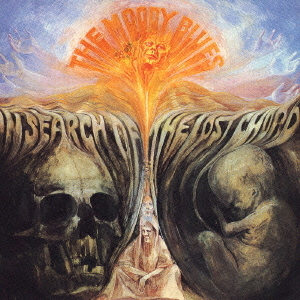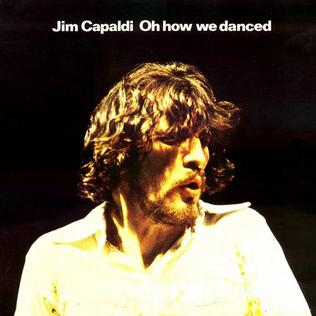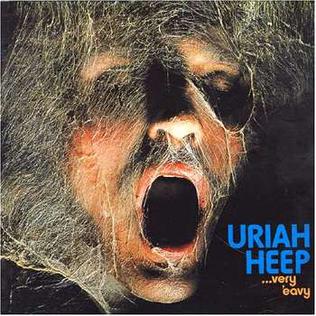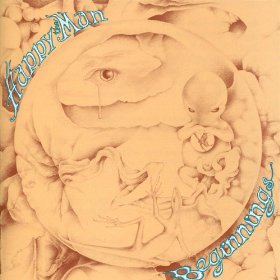
Thick as a Brick is the fifth studio album by the British rock band Jethro Tull, released on 3 March 1972. The album contains a continuous piece of music, split over two sides of an LP record, and is intended as a parody of the concept album genre. The original packaging, designed as a 12-page newspaper, claims the album to be a musical adaptation of an epic poem by fictional eight-year-old genius Gerald Bostock, though the lyrics were actually written by the band's frontman, Ian Anderson.

The Grand Illusion is the seventh studio album by American rock band Styx. Recorded at Paragon Recording Studios in Chicago, the album was released on July 7, 1977, by A&M Records.. The release was a smash worldwide, selling three million copies in the US alone. Some estimates have the album at over 6 million copies sold. The album launched the band to stardom and spawned the hit singles "Come Sail Away" and "Fooling Yourself." The title track also received substantial FM airplay, but was never released as an official single.

Soft Machine are a British rock band from Canterbury formed in mid-1966 by Robert Wyatt, Kevin Ayers, Daevid Allen, Mike Ratledge and Larry Nowlin. As a central band of the Canterbury scene, the group became one of the first British psychedelic acts and later moved into progressive rock and jazz fusion. Their varying line-ups have included former members such as Hugh Hopper, Elton Dean, and Andy Summers, and currently consists of John Marshall (drums), Fred Thelonious Baker (bass), John Etheridge (guitar), and Theo Travis

Larks' Tongues in Aspic is the fifth studio album by the English progressive rock group King Crimson, released on 23 March 1973 through Island Records in the UK and Atlantic Records in the United States and Canada. This album is the debut of King Crimson's third incarnation, featuring co-founder and guitarist Robert Fripp along with four new members: bass guitarist and vocalist John Wetton, violinist and keyboardist David Cross, percussionist Jamie Muir, and drummer Bill Bruford. It is a key album in the band's evolution, drawing on Eastern European classical music and European free improvisation as central influences.

Days of Future Passed is the second album and first concept album by English prog rock band The Moody Blues, released in November 1967 by Deram Records. With its fusion of orchestral and rock elements, it has been cited as one of the first examples of progressive rock.

Beggars Banquet is the 7th British and 9th American studio album by the English rock band the Rolling Stones, released on 6 December 1968 by Decca Records in the United Kingdom and London Records in the United States. It was the first Rolling Stones album produced by Jimmy Miller, whose production work formed a key aspect of the group's sound throughout the late 1960s and early 1970s.

In Search of the Lost Chord is the third album by The Moody Blues, released in July 1968 on the Deram label.

Third is the third studio album by the rock band Soft Machine, originally released in 1970 as a double LP, with each side of the original vinyl consisting of a single suite without individual track titles. Third marks the most major of Soft Machine's several shifts in musical genre over their career, completing their transition from psychedelic music to jazz, and is a significant milestone of the Canterbury scene. It was their first album with saxophonist Elton Dean.
Happy the Man is an American progressive rock band formed in 1973. The name Happy the Man is a reference to Goethe’s "Faust" and the Bible, rather than the 1972 Genesis single.

Caravanserai is the fourth studio album by American rock band Santana, released on October 11, 1972. The album marked a period of transition for Santana as it was the band's last to feature several key early members, while shifting in a more instrumental, progressive jazz fusion direction. It sold in fewer quantities than the band's previous chart-topping albums, stalling at No. 8 on the Billboard LPs chart, but has been critically acclaimed.

Kit Watkins is an American progressive-ambient-jazz recording artist based in Brattleboro, Vermont. He was previously a member of the band Happy the Man.

Wind of Change is the debut studio album by English rock musician Peter Frampton. It was released in 1972. The album features appearances by Ringo Starr, Billy Preston and Klaus Voormann.

Focus II is the second studio album by Dutch progressive rock band Focus, released in October 1971 on Imperial Records. Following the departure of original bassist Martin Dresden and drummer Hans Cleuver in 1970, the band recruited Cyril Havermans and Pierre van der Linden, respectively, and prepared material for a new album. Focus recorded Focus II in London in April and May 1971 with Mike Vernon as producer. The album features "Hocus Pocus" a hard rock song featuring keyboardist Thijs van Leer's yodelling, scat singing, and whistling, and "Eruption", a 22-minute track inspired by the opera Euridice by Italian composer Jacopo Peri.
Crafty Hands is an album by the progressive rock band Happy the Man, released in 1978. Only one track, "Wind Up Doll Day Wind," contains vocals.

I Can See Your House from Here is the seventh studio album by English progressive rock band Camel. Released in 1979, a new line up was introduced with founding members Andrew Latimer (guitar) and Andy Ward (drums) joined by bassist Colin Bass and keyboardists Jan Schelhaas and Kit Watkins who replaced Dave Sinclair. At one point, the album was going to be called Endangered Species.

Hatfield and the North is the first album by the English Canterbury scene rock band Hatfield and the North, released in February 1974.

Oh How We Danced is the debut studio album by the British musician Jim Capaldi. The album was recorded while Traffic was on hiatus due to Steve Winwood's struggles with peritonitis and was released by Island Records in 1972. Like his contemporary albums with Traffic, it was unsuccessful in his native United Kingdom but did better in the United States, reaching number 82 in the Billboard 200 chart and producing the hit single "Eve", which reached number 91 in the Billboard Hot 100.

...Very 'Eavy ...Very 'Umble is the debut studio album by British rock band Uriah Heep.

Beginnings is an album by the progressive rock band Happy the Man, released in 1990 but composed of material written and recorded during Happy the Man's first two years, 1974 and 1975. Originally recorded on 2- and 4-track tape as demos, the material was compiled and transferred to DAT where additional mixing and processing was added by Kit Watkins.

Stone Alone is the second solo album by the Rolling Stones' bass guitarist Bill Wyman. It was released in 1976 by Rolling Stones Records. The album reached number 166 on the Billboard 200.

















